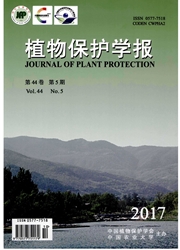

 中文摘要:
中文摘要:
为增强番茄耐盐能力,采用菌液浸种、灌根以及蒽酮比色和钼锑抗显色等方法,研究巨大芽胞杆菌BacillusmegateriumCJLC2菌株增强番茄耐盐能力的效果及其作用机制。在非NaCl胁迫条件下,CJLC2菌株显著促进番茄的生长,对根长、株高和鲜重的促生率分别为14.33%、9.20%和17.75%。在NaCl胁迫条件下,随NaCl浓度增加对番茄的生长抑制作用增大,而CJLC2菌株在一定程度上提高了番茄对NaCl耐受能力。其中,番茄对100mmol/LNaCl的耐受能力显著提高,加菌处理对根长、株高和鲜重的促生率分别为17.05%、18.04%和15.81%。CJLC2菌株可提高番茄叶片可溶性糖和可溶性蛋白含量,在200mmol/LNaCl处理时效果显著,分别提高了40%和41%。CJLC2菌株还影响番茄矿物质元素的含量,其中在100mmol/LNaCl胁迫下,加菌处理番茄根系磷、钾、铁、铜和锌的含量以及K7Na’比值分别提高190%、12.88%、6.80%、34.78%、10.17%和50.72%,而根系钠的含量降低25.11%。此外,CJLC2菌株可降低受害番茄乙烯的含量。研究表明,巨大芽胞杆菌CJLC2菌株通过提高番茄耐盐相关生理生化指标,增强番茄的耐盐能力并促进其生长。
 英文摘要:
英文摘要:
In this study, different methods, including seed soaking, root drenching, anthrone colorime- try, and Mo anti-antimony colorimetry, were used to study the effects and the corresponding mechanisms of the Bacillus megaterium CJLC2 on the salt-tolerance of tomato. The results showed that CJLC2 could significantly increase the growth of tomato at the absence of NaC1, and the promotion rates of root length, plant height and fresh weight of tomato were 14.33% , 9.20% and 17.75% , respectively. Under the salt stress of NaC1, the increase of NaC1 concentration had stronger inhibitory effect on tomato growth. However, CJLC2 could improve the tolerance of tomato to NaC1 to a certain extent. The best effect was achieved when the tomato was treated with 100 mmol/L NaC1, in which CJLC2 could increase the root length, plant height and fresh weight by 17.05%, 18.04% and 15.81%, respectively. When the tomato seedlings were treated with 200 mmol/L NaC1, CJLC2 could increase the contents of soluble sugars and soluble proteins of the tomato by 40% and 41%, respectively. When the tomato seedlings were treated with 100 mmol/L NaC1, CJLC2 could improve the contents of P, K, Fe, Cu, Zn, and K+/Na + ratio in tomato roots by 190%, 12.88%, 6.80%, 34.78%, 10.17%, and 50.72%, respectively, and CJLC2 could also reduce the content of the Na by 25.11%. The results also indicated that CJLC2 could reduce the content of ethylene in damaged tomatoes. Overall, B. megaterium CJLC2 could improve the salt toler- ance of tomato and promote the growth by enhancing the salt-tolerance related physiological and biochemi- cal characters.
 同期刊论文项目
同期刊论文项目
 同项目期刊论文
同项目期刊论文
 Bacilysin overproduction in Bacillus amyloliquefaciens FZB42 markerless derivative strains FZBREP an
Bacilysin overproduction in Bacillus amyloliquefaciens FZB42 markerless derivative strains FZBREP an Bacilysin from Bacillus amyloliquefaciens FZB42 has specific bactericidal activity against harmful a
Bacilysin from Bacillus amyloliquefaciens FZB42 has specific bactericidal activity against harmful a 期刊信息
期刊信息
